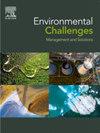National innovation systems and sustainable environmental performance: A cross country analysis
Q2 Environmental Science
引用次数: 0
Abstract
This research seeks to understand the role of national innovation systems (NIS) in addressing countries’ environmental performance, namely their environmental health, ecosystem vitality, and climate change. The role played by NIS in these societal challenges was tested in 130 countries through cross-sectional models using the updated data from 2022/2021. The major findings of this research revealed that NIS contribute insignificantly to the attainment of meaningful environmental goals, such as enhancing ecosystem vitality or mitigating climate change. Despite making a positive impact towards protecting the population from environmental risks, NIS urgently need to make a paradigm shift towards environmental sustainability.
国家创新体系与可持续环境绩效:跨国分析
本研究旨在了解国家创新体系(NIS)在解决国家环境绩效(即环境健康、生态系统活力和气候变化)方面的作用。利用 2022/2021 年的最新数据,通过横截面模型对 130 个国家的国家创新体系在应对这些社会挑战方面发挥的作用进行了测试。这项研究的主要发现表明,国家创新系统对实现有意义的环境目标(如增强生态系统活力或减缓气候变化)的贡献微乎其微。尽管国家创新系统对保护民众免受环境风险产生了积极影响,但亟需向环境可持续性模式转变。
本文章由计算机程序翻译,如有差异,请以英文原文为准。
求助全文
约1分钟内获得全文
求助全文
来源期刊

Environmental Challenges
Environmental Science-Environmental Engineering
CiteScore
8.00
自引率
0.00%
发文量
249
审稿时长
8 weeks
 求助内容:
求助内容: 应助结果提醒方式:
应助结果提醒方式:


